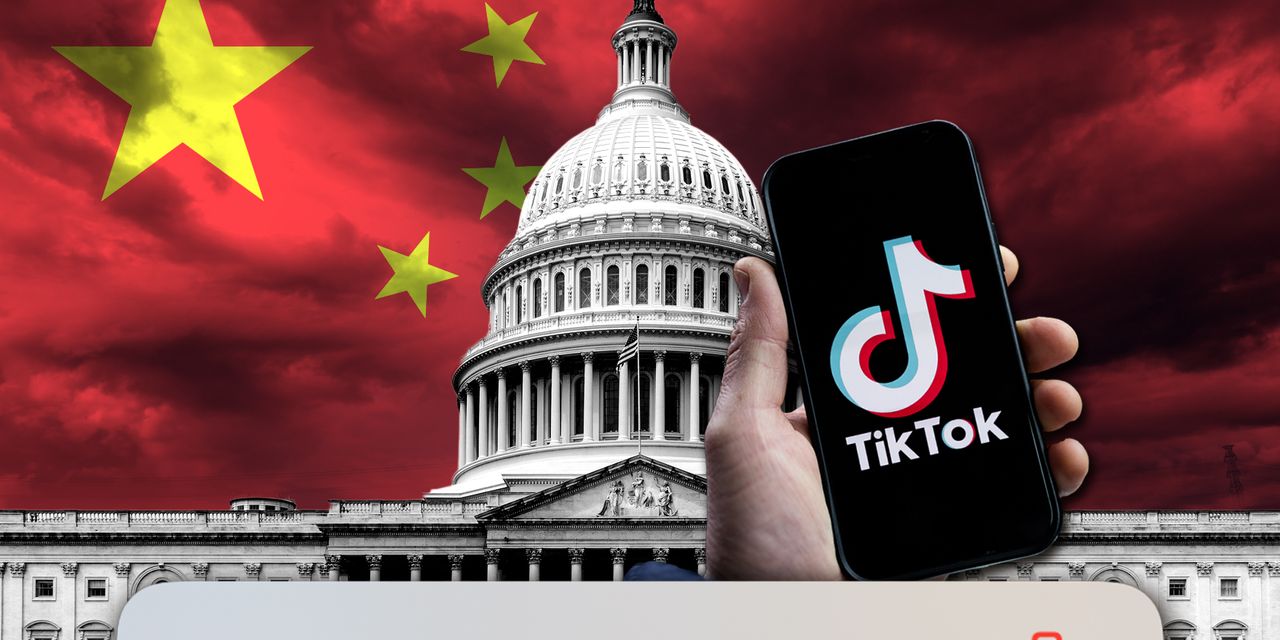A fresh push in the bipartisan effort to ban TikTok in the U.S. failed Wednesday, as Republican Sen. Josh Hawley was blocked while seeking an expedited vote on the issue.
Hawley had aimed for Senate passage by unanimous consent for his bill to prohibit the video-sharing app from being downloaded on U.S. devices. The senator from Missouri argued his measure “sends the message to Communist China that you cannot buy us.”
But a fellow Republican, Sen. Rand Paul of Kentucky, objected, citing the First Amendment and saying that speech is “protected whether you like it or not.”
A different bill aimed at TikTok is widely viewed as having a better chance of becoming law. The Restrict Act, proposed by Democratic Sen. Mark Warner of Virginia and Republican Sen. John Thune of South Dakota, would give the U.S. commerce secretary new abilities to ban foreign technologies on national-security grounds. It has the support of the Biden administration, and Warner said Thursday that its number of co-sponsors in the Senate had grown to 26.
Warner indicated he expects to attract more Democratic co-sponsors and highlighted how the Restrict Act has support from both conservative and moderate Republicans.
“We’ve got a number of additional Democratic senators that I think we’ll be able to sign on. I’m trying to do this on a two-by-two basis,” the senator told reporters on Thursday.
“The last two senators we signed on are my friends Mike Crapo from Idaho and John Boozman from Arkansas. They are very much viewed as staunch conservatives, so yes, we have Mitt Romney and Susan Collins, but we also have folks like Mike Crapo and John Boozman. And I think the reason is that people are looking not for a kind of one-off, whack-a-mole approach, but for a rules-based approach that will apply not only potentially to TikTok, but to other foreign technologies that come from places like China and Russia that pose a national-security risk.”
See: TikTok CEO criticized by Democrats and Republicans at hearing, as bill that could ban app picks up more supporters
Warner and Thune are working with the sponsor of a House bill targeting TikTok, seeking to overcome differences and merge the two measures, according to a Semafor report. The House legislation comes from GOP Rep. Michael McCaul of Texas, who chairs the chamber’s Foreign Affairs Committee.
So, is TikTok actually going to get banned in the U.S. this year?
After TikTok CEO Shou Zi Chew endured a bipartisan grilling last week in a House hearing, finding little support among Democrats and Republicans, some analysts have predicted that a prohibition is in fact likely. Others have said it’s not.
The chances for a ban are above 90%, said Wedbush analysts led by Daniel Ives in a note on Sunday, because the hearing on Capitol Hill was a “disaster” for TikTok.
In a similar vein, Pangea Policy’s Terry Haines has put the odds for a prohibition at 85%, up from 75% before Chew’s testimony before the House Energy and Commerce Committee.
On the other hand, Evercore ISI’s Tobin Marcus has suggested the app won’t be taken away from its 150 million U.S. users.
“We have heard some other analysts speculate that legislative restrictions on the company could move much faster in the wake of this hearing,” Marcus said in a note. “But we would take this with a grain of salt. Despite widespread hostility to TikTok, there are still competing visions in Congress about the right response, and it will be very hard to move standalone legislation. We still think the likely window for Congressional action is [the fourth quarter], and that the odds are below 50%.”
Related: Without TikTok, what would Americans do with their 53 billion free hours?
Robert Kaminski of Capital Alpha Partners also isn’t predicting a prohibition on the app, which is owned by Beijing-based ByteDance Ltd.
“We still do not expect Congress to enact new law banning TikTok,” Kaminski wrote.
“The hearing reinforced our long-held ‘Chaos Theory of Big Tech,’ which says that the many disparate critiques of tech companies complicate Congressional action to solve any single one. The China affiliation was front and center in the hearing, but the discussion covered broader tech platform themes,” he wrote.
A ban on TikTok could help U.S. social-media players such as Snapchat parent Snap Inc.
SNAP,
Facebook parent Meta Platforms Inc.
META,
and YouTube parent Alphabet Inc.
GOOG,
GOOGL,
while software giant Oracle Corp.
ORCL,
— which counts TikTok as a customer — could be hurt, according to a recent note from analysts at Height Capital Markets.
Height’s Benjamin Salisbury has put the odds of a legislative ban or a forced sale for TikTok at around 55%.
Now read: Why Thursday’s House hearing on TikTok was different than previous tech beatdowns
Opinion: Instead of banning TikTok, Congress should do its actual job
Read the full article here








